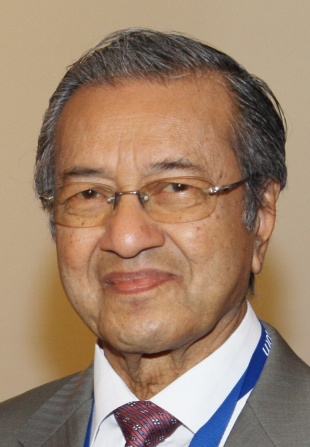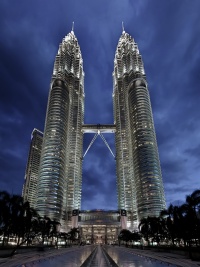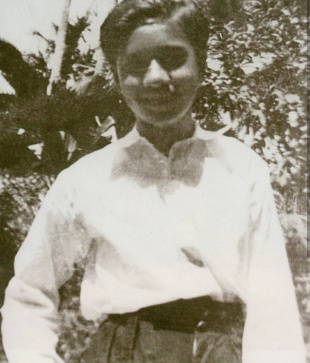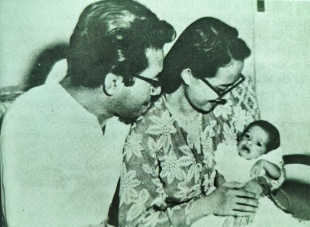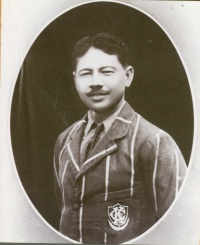MAHATHIR MOHAMAD
Datuk Seri Mahathir bin Mohamad was Malaysia's fourth and seventh prime minister, serving for 22 years from 1981 to 2003 and returning for a two year stint from 2018 to 2020. He was the longest-serving democratically-elected leader in the world and for a while the longest serving ruler of any kind in Asia. Known in Malaysia as "Dr. M." and the "old man," he was a potent political force in the 1970s, often determining the national agenda.
Alan Sipress wrote in the Washington Post: Mahathir, has made a career of confrontation. Along the way, he has become the most dominant figure in his country's history and has sought to propel Malaysia into the ranks of the developed world through the sheer force of his will.” When he retired it was “a milestone not just for Malaysia but for all of Southeast Asia. Mahathir is the last in a generation of strongmen. Some, like Ferdinand Marcos of the Philippines and Suharto of Indonesia, were pushed from office. Others, like Lee Kuan Yew of Singapore, withdrew at a time of their own choosing. "He is a true patriot because he broke our mental barrier. Malaysians thought they couldn't achieve greatness equivalent with that of Western countries," said Abdul Razak Baginda, executive director of the Malaysian Strategic Research Center.[Source: Alan Sipress, Washington Post, October 27, 2003 =]
Mahathir was a physician in his home state of Kedah when he was elected to parliament in 1964, quickly beginning to advocate for the urgent economic advancement of the Malay community, which lagged behind other ethnic groups. Eleven years later, he secured a senior position in the ruling United Malay National Organization (UMNO), the party that had dominated Malaysian politics since independence in 1957. He became prime minister in 1981 following the resignation of his predecessor, Tun Hussein Onn.
Supporters credit Mahathir with maintaining ethnic peace, yet critics argue that he has manipulated the threat of violence to justify suppressing political dissent and curbing free expression. He consistently emphasized the importance of Malays standing on their own in a nation where they form a slim majority, while the remainder of the population is divided mainly between Chinese and Indians. At the same time, he cultivated an environment in which few dared to challenge his authority.
Within UMNO, Mahathir eliminated rivals, most notably his deputy prime minister and heir apparent, Anwar Ibrahim, after Anwar began promoting his own supporters within the party and criticizing Mahathir’s economic policies. Mahathir dismissed Anwar, accusing him of immorality and corruption. In response, Anwar mobilized his followers in public protests demanding government reform. In 1998, Anwar was arrested, beaten in custody by the police chief, and subsequently brought to trial in front of global media with a visibly bruised eye, facing charges of sodomy and corruption. He was convicted in two separate trials and sentenced to 15 years in prison. The proceedings drew widespread condemnation from human rights organizations and foreign governments, who deemed them politically motivated.
RELATED ARTICLES:
MALAYSIA UNDER MAHATHIR MOHAMAD factsanddetails.com
RISE OF MODERN MALAYSIA 1963-1990: DEVELOPMENT, ECONOMICS, POLITICS factsanddetails.com
COMMUNIST INSURGENCY IN MALAYSIA (1946-1989): ORIGINS, ACTIVITIES, POLITICS, ENDING IT factsanddetails.com
THE EMERGENCY IN MALAYSIA: DRACONIAN LAWS, NEW VILLAGES, ATROCITIES factsanddetails.com
MALAYSIAN INDEPENDENCE AND THE CREATION OF MALAYSIA factsanddetails.com
SINGAPORE IN THE LATE 1950s, EARLY 1960s: PART OF MALAYSIA OR AN INDEPENDENT STATE factsanddetails.com
MALAYSIA AFTER WORLD WAR II factsanddetails.com
RACIAL DISCORD IN MALAYSIA: RIOTS ON MAY 13, 1969, AFFIRMITIVE ACTION, BOAT PEOPLE factsanddetails.com
ELECTIONS IN MALAYSIA factsanddetails.com
POLITICS IN MALAYSIA: LEADERS, ETHNICITY, RELIGION, SYMBOLS, PROTESTS factsanddetails.com
POLITICAL PARTIES IN MALAYSIA factsanddetails.com
ASIAN FINANCIAL CRISIS OF 1997-98 IN MALAYSIA factsanddetails.com
ABDULLAH AHMAD BADAWI: MALAYSIA PRIME MINISTER (2003-2009) factsanddetails.com
NAJIB RAZAK: LIFE, POLITICAL CAREER, SCANDALS factsanddetails.com
MALAYSIA UNDER PRIME MINISTER NAJIB RAZAK 2009-2018 factsanddetails.com
1MDB SCANDAL: BILLIONS, BIRKIN BAGS, CELEBRITIES, JHO LOW, JAILTIME FOR NAJIB factsanddetails.com
ANWAR IBRAHIM'S LIFE AND POLITICAL CAREER factsanddetails.com
ANWAR IBRAHIM'S TRIALS, LEGAL PROBLEMS AND TIME IN JAIL factsanddetails.com
ANWAR IBRAHIM FINALLY BECOMES PRIME MINISTER factsanddetails.com
Mahathir Achievements
Mahathir is credited with transforming Malaysia from a rubber-dependent backwater divided by ethnic rivalries into a well-oiled, high-tech Asian tiger. He became a respected—albeit controversial—voice on the international stage and helped Malaysians have pride in themselves. Known for his personalized, paternalistic style, he was the leader of the United Malays National Organization (UMNO) political party. He was the strategist behind his country's rapid economic growth and development.
Under Mahathir, Malaysia was remarkable stable. There were no coups, blood baths or major uprising. Although he was no democrat, Mahathir was not a dictator. He never used the army or the police or brutal methods to retain power. Once voted by Asiaweek as the forth most powerful people in Asia, Mahathir is known for speaking his mind and taking a stand on issues that often angered Washington. Chandra Muzzaffar wrote in Time, “His power pervades. His authority penetrated. His influence permeates.”
Richard Lloyd Parry wrote in The Times: “Dr Mahathir is a towering presence in South-East Asia, the man who more than anyone else shaped the modern Malaysia. After coming to power in 1981, he was unassailable, a figure of vast energy who goaded Malaysians into unprecedented economic achievement while fulminating against the arrogance of the West. Malaysia was a democracy, but a timid one in which the press agreed with almost everything the government said. Those who spoke out against the government were liable to find themselves locked up without trial under the British colonial era’s Internal Security Act. [Source: Richard Lloyd Parry, The Times, October 30, 2006]
Mahathir's Life
The son of a lower middle class hospital worker and schoolteacher in a rural village, Mahathir was born at his parents' home in December, 1925 in in a poor neighbourhood in the town of Alor Setar in the state of Kedah northwestern Malaya. He was the youngest of 10 children. For a while he sold bananas in a wet market. His father, Mohamad bin Iskandar was originally from Penang; his mother was from Wan Tempawan, was from Kedah. Both were of Malay descent. One spect of Mahathir's birth set him apart: he was not born into the aristocracy or a prominent religious or political family. His father was a school principal whose modest means meant his daughters could not attend secondary school, while his mother, Wan Tempawan Mahathir, had only a distant connection to Kedah’s royalty. Both parents had been married previously, and Mahathir had six half-siblings and two full siblings. [Source: Wikipedia]
Mahathir grew up during British colonial rule in Malaysia, when the Chinese and Indians dominated the economy. Reflecting on the Malay Peninsula before World War II, he wrote it was “divided into many different Malay states, and each state had its own treaty with the British. The treaties were for British ‘protection,’ it was said, not colonization. The British were not too repressive...Although the British actually controlled the administration fully, they managed to give the impression that locals had status and authority. The Malaysia sultans were called ‘the rulers’ by the British, although they were never really given any power to ‘rule.’” Describing an ordinary Malayan town in the 1930s, he recalled, “The rich families lived in the northern part of town; we lived in the southern. And the Europeans of course, lived in their own quarters. They were very exclusive with their own clubs and private golf course and did not mix with the local population.” On the impact of World War II, he observed, “The success of the Japanese invasion convinced us that there is nothing inherently superior in the Europeans. They could be defeated, they could be reduced to groveling before an Asian race, the Japanese.”
Mahathir was a disciplined, hard-working student. His father’s strict guidance motivated him to study, while he showed little interest in sports. He earned a place in a selective English-medium secondary school, having become fluent in English well ahead of his primary school peers. With schools closed during the Japanese occupation, he went into business, first selling coffee and later pisang goreng (banana fritters) and other snacks. After the war, he graduated from secondary school with high marks and enrolled to study medicine.
He made a name for himself as a Malay nationalist and a firebrand student leader after, the story goes, he was denied a scholarship to an English university because his father was not an aristocrat. Some believe his confrontational style has its roots in the injustices he experienced growing up under colonialism. Reflecting on his early political activities at university, Mahathir wrote: “I got together with my classmates and quietly we began agitating against the Malayan Union proposal. We were not allowed to be involved in political activity, so most of our work took place at night...We moved around the night putting up posters with political messages.”
Mahathir trained as a physician in Singapore at the King Edward VII College of Medicine (now part of the National University of Singapore). He practiced medicine for several years before entering politics after Malaysia gained independence in 1957. After graduation, he worked in government service and married in 1956. The following year, he returned to Alor Setar to establish his own practice, becoming the town’s first Malay doctor. He prospered, building a large house, investing in various businesses, and employing a Chinese chauffeur to drive his Pontiac Catalina—at a time when most chauffeurs were Malay.
Mahathir wife, Siti Hasmah Mohamad Ali, is also a physician. They met in college and were married in 1956. They have three sons and four daughters. Mahathir and Siti Hasmah had their first child, Marina, in 1957, before conceiving three others and adopting three more over the following 28 years.
Mahathir's Early Political Career
Mahathir was elected to parliament in 1964. Almost immediately he began expressing his ideas about the need for the economically backward Malays to advance. In 1969, he was thrown out the HMNO and published a work called “The Malay Dilemma”, which outlined the shortcomings of the Malay people, argued the subservience of Malays to Chinese had cultural and genetic roots and criticized the leader at the time, Tunku Abdul Rahman, of “selling Malay rights to the Chinese.”
Mahathir was sent into political exile in Kedah. He was welcomed back in the party in 1971 after Tunku resigned in September 1971. He was rehabilitated within the party in 1972 for pushing affirmative action and was appointed to Education minister in 1974.
The restoration of democracy after the 1969 crisis caused disputes in the UMNO, a struggle of power which increased after the death of Tun Abdul Razak. The ailing Datuk Hussein Bin Onn replaced him, but the fight for control shifted to appointing the deputy prime minister. Mahathir bin Mahamad was chosen, an advocate of bumiputra who also tried to benefit the other ethnic communities. [Source: Wikipedia]
The government policy on education in the 1970s was driven mainly by Mahathir first as Education Minister and then as Prime Minister, with the aim of transfering economic power to the Malays. Mahathir greatly expanded the number of secondary schools and universities throughout the country, and enforced the policy of teaching in Malay rather than English. This had the effect of creating a large new Malay professional class. It also created an unofficial barrier against Chinese access to higher education, since few Chinese are sufficiently fluent in Malay to study at Malay-language universities. Chinese families therefore sent their children to universities in Singapore, Australia, Britain or the United States. Mahathir also greatly expanded educational opportunities for Malay women – by 2000 half of all university students were women.
Mahathir's Character and Hobbies
Mahathir stood up for the rights of Malays but at the same time harangued them for being backward, uneducated, greedy, lazy and ungrateful to his party and said they were underachievers and they failed to recognize their weakness, choosing instead to blame others. He also publically scolded hi minsters and members of his party.
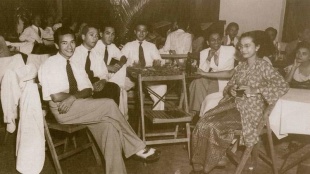
Mahathir was infamous for his controversial remarks and pro-Islamic activities. In 2008, he urged the world's 1.3 billion Muslims to boycott Dutch products following the release of the anti-Islam movie Fitna by the right-wing Dutch politician Geert Wilders. He also urged all Muslims to boycott the anti-Islam documentary Islam: What the West Needs to Know and called for the arrest of the film directors Gregory Davis and Bryan Daly. He said that Orang Asli were not entitled more rights than Malays even though they were natives to the land. On his blog he compare the Orang Asli in Malaysia to Native Americans in the U.S., Maoris in New Zealand, and Aboriginals in Australia. He was criticized by spokespeople and advocates for the Orang Asli who said that the Orang Asli desired to be recognized as the natives of Malaysia and that his statement would expose their land to businessmen and loggers.
On his outspokenness, Mahathir once said. “I’m brash and abrasive but that’s because I’ve noticed when people are nice and polite they never get anywhere.” On another occasion he said, "Shooting from the hip is not good for hitting targets but sometimes it serves a useful purpose.” Although his statements may have helped him appear as a fighter before Malaysians, during the Asian Financial Crisis in 1997-98 they did not inspire confidence and trust among people in the international financial community and ended up making a bad economic situation worse.
Mahathir does not drink or smoke. He likes Italian opera and golf and used to fly around in a Falcon 900 executive jet. As prime minister Mahathir was known for his keen eye for detail and his meticulousness. He was known for inspecting the toilets at airports, checking drains on city streets and ordering bureaucrats to plant trees.
Alan Sipress wrote in the Washington Post: “Mahathir has promoted himself as a great visionary. But he has busied himself with the smallest details, ordering that all government employees wear name tags and taking a personal interest in the cleanliness of public bathrooms. He has cooperated closely with the United States in combating terrorism. But he has also repeatedly antagonized the West, suggesting early this year that the victims of the Sept. 11, 2001, attacks could be considered "collateral" damage in a wider war between militants and the West. He warned Malaysians this summer that greedy Westerners were determined to "colonize us directly or indirectly."[Source: Alan Sipress, Washington Post, October 27, 2003]
Mahathir and Asian Values
Mahathir and Singaporean Prime Minister Lee Kuan Yew were major mouthpieces for the Asian values viewpoint. In the late 1990s it was fashionable to explain Asia’s economic success and prosperity in terms of “Asian values,” a collection of attributes such as a belief in hard work, thriftiness, propensity to save, filial piety, national pride, respect for order and authority, coherence of a society, and a commitments to common ideals, goals and values that place the common good ahead of the individual. Questioning authority and seniors was regarded as disrespectful, un-Confucian and un-Asian.
Some Asian value advocates went further and argued that Asian values created a better society. High rates of crime, unemployment, divorce, drug use and welfare dependency in Western societies were explained in part, the advocates said, by the fact that Westerners were lazy, selfish and greedy; and they sent their elderly to nursing homes and married several times. Asians by contrast did not have so many problems because they cared for their grandparents, shunned divorce, worked hard, saved their money and were devoted to their families.
Mahathir attributed Malaysia's success to Asian values. He once said, "The Eurocentric world is finished. Asians have now found the formula." In his book “The Voice of Asia”, Mahathir wrote, "Western societies are riddled with single-parent families...with homosexuality...with unrestrained avarice, with disrespect for others and, of course, with rejection of or religious teachings and values." Mahathir blamed the Western media for destroying Asian values. He also said that too much freedom was a bad thing and getting smacked with a rod when he was a child helped set him in the right path. He was interested in setting up a Southeast Asia Common Market to foil speculators.
Mahathir’s Controversial Statements
Mahathir made a number of anti-Jewish statements. In October 2003, he said, “Jews rule the world by proxy. They get others to fight and die for them.” After being widely condemned in the West and reportedly snubbed by U.S. President George Bush at an international meeting he said, “Lots of people make nasty statements about us, about Muslims. People call Muslims terrorists, they even say, Muhammea was a terrorist...But if you say anything at all about the Jews, you are accused f being anti-Semitic.” The statements drew little attention in the Middle East, where most people regarded what he said as historical facts. Many Malaysians had no problem with the statement either.
Mahathir once lashed out against “Jews who determine our currency levels, and bring about the collapse of economies.” In a speech before 57-nation Organization of the Islamic Conference, the world’s largest Muslim organization, Mahathir received a standing ovation after he said that Jews control the world and frustrated Muslims should emulate them. In the speech he said: “We [Muslims] are actually very strong, 1.3 billion people cannot be simply wiped out. The Europeans killed 6 million Jews out of 12 million [during the Holocaust]. But today the Jews rule the world by proxy. They get others to fight and die for them. They invented socialism, communism, human rights and democracy so that persecuting them would appear to be wrong so they may enjoy equal rights with others. With these they have now gained control of the most powerful countries. And they, this tiny community, have become a world power. He also named Israel as "the enemy allied with most powerful nations."
Later U.S. President Bush told Mahathir in private the comments were “wrong and divisive.” Mahathir defended his remarks, saying: "I am not anti-Semitic.... I am against those Jews who kill Muslims and the Jews who support the killers of Muslims." He tagged the West as "anti-Muslim", for double standards by "protecting Jews while allowing others to insult Islam." He also said "But when somebody condemns the Muslims, calls my prophet, "terrorist", did the European Union say anything?" Mahathir's public remarks about Jews date back as early as 1970 when he wrote in his controversial book The Malay Dilemma: "The Jews for example are not merely hook-nosed, but understand money instinctively." Mahathir has also been critical of Muslims, calling them superstitious and backward, saying they need to overcome divisions and unite, embrace modern knowledge and technology and said they have achieved “nothing” in more than 50 years of fighting Israel.
Mahathir’s controversial statements often served his interests both domestically and internationally. They often played well at home plus propelled him to the world stage. When he made his remarks about the Jews, for example, he received a standing ovation from leader in the Islamic word, made headlines in newspapers in the West and received a positive response at home. Mahathir once likened a Chinese lobby group to Communists and racial extremists.
Mahathir Retires
After 22 years, Mahathir retired in October 2003. He handed power to his anointed successor, Abdullah bin Ahmad Badawi, who went on to convincingly win a general election. Mahathir formally left office at the age of 77 when the Malaysian king formally accepted his resignation. He was the last of the great Asian strongmen—which included Marcos, Suharto and Lee Kuan Yew—to go. In one rally, 50,000 supporters showed at a soccer stadium to wish him well. Mahathir began his retirement by flying out for a European vacation. "I just want to take a rest," he said.
Sean Yoong of Associated Press wrote; “Mahathir retired as a lionized figure among Malaysia’s 25 million people on October 31, 2003, after firmly establishing the country as a booming Southeast Asian tiger economy. When Mahathir became prime minister in 1981, the country was a tropical backwater, reliant on rubber and tin mining. Today, with an annual per capita income of US$4,036, it is on the verge of being classified as a developed country, and one of its biggest tourist attractions is the Petronas Twin Towers, formerly the world’s tallest buildings. [Source: Sean Yoong, Associated Press, October 25, 2004]
Alan Sipress wrote in the Washington Post: There was no way Mahathir Mohamad was going quietly. With only days remaining in his 22-year tenure as prime minister, the irascible Malaysian told a summit of Islamic leaders recently that Jews rule the world by proxy. Rebukes rained down from Western leaders. But in that same address he also skewered his fellow Muslims, calling them a backward people, crippled by religious superstition and enfeebled by infighting. As for the ethnic Malays who make up the majority in his country — and whose cause he has championed since first taking office — he has persisted in scolding them to the end like recalcitrant schoolchildren. Lazy and ungrateful, he carps. [Source: Alan Sipress, Washington Post, October 27, 2003]
In June 2002, Mahathir announced that he was going to retire. He announced that he planned for his deputy prime minister, Abdullah Ahmad Badawi, to replace him and then took off for a vacation in Italy. Most Malaysians, even members in his own party, were caught of guard by the announcement. In announcing the decision, Mahathir said simply that he had been in power long enough. Mahathir announced his resignation in a prepared speech before his party's annual congress, setting off a long, meticulous transition. Some cabinet members shed tears in the his last cabinet meeting—his 883rd—before his official retirement. For a while there it seemed as if Mahathir he might never retire. When asked when he planned to step down, Mahathir said in February 1999, "I will stay here unless somebody shoots me or tries to assassinate me." In January 1999, Mahathir engaged in a major reshuffling of his cabinet. The most significant change was that Abdullah Ahmad Badawi was appointed as deputy prime minister and minister for home affairs. In December 1999, after the BN coalition won a decisive victory in national elections, Mahathir announced that he would not run again for office and officially declared Abdullah as his chosen successor.
Mahathir After His Retirement
After his retirement, Mahathir still played a significant role behind the scenes by influencing the choice of cabinet positions. He continued to let his opinions be known and make controversial remarks. His primary targets were the Jews and his successor as prime minister, Abdullah Ahmad Badawi.
In October 2006, Voice of America News reported: Mahathir said “he will continue to criticize the government of his hand-picked successor, Abdullah Ahmad Badawi, dimming hopes the two men could patch up a rift that has gripped the nation. The two men held a one-on-one meeting Sunday to try to resolve their differences, but the always outspoken Mr. Mahathir told reporters later that he was not satisfied with the talks.The former prime minister is unhappy with Mr. Abdullah's decision to put several major infrastructure projects initiated during Mr. Mahathir's 22 year-rule on hold, among them a new bridge linking Malaysia and Singapore.
Over the past several months, Mr. Mahathir has accused Mr. Abdullah of corruption, nepotism and incompetence, all of which, he says, undermine support for the United Malays National Organization, the political party that has run Malaysia for the past four decades. Mr. Abdullah has denied those accusations but has generally responded with silence to Mr. Mahathir's attacks. [Source: Voice of America News October 23, 2006 ^^]
Mahathir told reporters he will continue to speak his mind if he feels government policies are not benefiting Malaysia. "I will continue to [criticize] until there is some change and until I achieve some results because I'm 82 years old and people believe that if they delay long………then I would not be able to speak," he said. Mr. Mahathir says the government is trying to prevent him from airing his grievances in public and says Mr. Abdullah has turned Malaysia into a police state. ^^
Dr Mahathir has said that Mr Abdullah should be replaced by Najib Razak, the deputy prime minister, unless the government changes its policies. Dr Mahatir's criticism of his successor has found support within the UMNO, whose members worry that country's affirmative action programme benefiting the ethnic Malay majority, the party's base, is being diluted by Mr Abdullah.
Mahathir’s Anti-Israel, Pro-Palestinian Activities After His Retirement
In May 2005. Mahathir accused Israel of barring him from Jerusalem and Jenin. Associated Press reported: Mahathir “said Israel's government barred him from visiting the West Bank town of Jenin last week to prevent him from seeing Israeli atrocities against Palestinians, news reports said. "Jenin is a place where the Israelis caused massive destruction and killed many Palestinians," Mahathir was quoted as saying by local reports after his return from the West Bank. "That is why they prevented me from going there." Mahathir, who angered Jews and Western leaders for an inflammatory speech to Muslim leaders in 2003, said he was held up for more than two hours by Israeli border police. As he entered the West bank from Jordan, . He also said he was told he would ot be able to visit Jerusalem. [Source: AP, May 24, 2005]
In January 2010, at The General Conference For The Support of Al Quds, Mahathir stated, regarding the Holocaust and Israel, that: The Jews had always been a problem in European countries. They had to be confined to ghettoes and periodically massacred. But still they remained, they thrived and they held whole Governments to ransom...Even after their massacre by the Nazis of Germany, [Jews] survived to continue to be a source of even greater problems for the world...The Holocaust failed as a final solution. Mahathir also stated that: "Creating a state for them was thought to be a better solution. It could be if some European territory had been allocated to make a permanent ghetto for the Jews. But of course if this was done then the affected European state would rise in arms and kill all the Jews the way they had been doing before. So the debate was about creating an Israeli state in Uganda, Africa, or somewhere in Latin America or Palestine of course."
Ian Buruma wrote in The New Yorker, “I saw Dr Mahathir, whose views are still widely read on his daily blog, Che Det, at a demonstration protesting the Israeli attack on Gaza. As I arrived at the Bangsar Sports Complex, he was finishing his diatribe against “the Jews” and “Jewish atrocities,” wildly cheered by groups of schoolchildren in Palestinian-style scarves and black tudung. They disappeared as soon as the former prime minister, smiling a little menacingly at the young, left the scene. Later, I read in a newspaper that the government had planned to mobilise “about five million pupils and 360,765 teachers from more than 10,000 schools,” to protest against what posters in the Bangsar Sports Complex termed “Holocaust II.” [Source: Ian Buruma, The New Yorker, May 19, 2009 ]
I looked around the now depleted hall, and was puzzled by posters that read, in Malay, “Stop the atrocities against us.” I turned to an elderly Chinese-looking gentleman sitting behind me. “Who is this “̃us’?” I asked. With a sly grin, he replied, “Don’t you know? It means the Malays.” What atrocities had the Israelis perpetrated against the Malays? “Palestinians, Malays “” they’re all Muslims,” the old man said. He shifted his chair closer. “I’m just here to observe,” he said, lowering his voice. “I’m not pro-Palestinian at all. I have Jewish friends, you know. Lend a hundred thousand dollars to a Jew and you’ll always get it back. Lend it to a Muslim and he’ll cheat you, for sure. They’re all liars and cheats, the Muslims.”
Mahathir Says Its Okay for Muslims to Kill French People
In a 2019 meeting in Kuala Lumpur of leaders of Muslim countries, attended by Iranian President Hassan Rouhani, Turkish President Recep Tayyip Erdogan and Emir of Qatar Sheikh Tamim bin Hamad Al Thani, called on these leaders to come up with a concerted plan to address Islamophobia. He said “disreputable acts of terror” had caused fear of the religion to the point of creating phobia...Yes, we are angry and frustrated. We cannot wage a conventional war. No country would help us. But even so, what do we gain by such indiscriminate violent acts? Nothing.” [Source: Bloomberg, December 19, 2019]
However, in October 2020, Mahathir sparked international outrage after posting a series of remarks on Twitter and Facebook following a deadly knife attack at a church in Nice, southern France, which left three people dead. Although Mahathir did not directly refer to the Nice attack, his comments were issued amid heightened tensions after the beheading of French teacher Samuel Paty, who had shown caricatures of the Prophet Muhammad in class. Mahathir said he did not approve of Paty’s killing, but argued that freedom of expression should not include insulting others’ beliefs. He wrote that Muslims had a right to be angry over historical French violence against Muslims and controversially stated that they had a “right to kill millions of French people,” while adding that Muslims had generally not acted on such anger and that the French should also refrain from doing so. [Source: A. Ananthalakshmi and Rozanna Latiff, Reuters, October 30, 2020; AFP, October 30, 2020]
The remarks triggered a strong backlash, particularly from the French government. France’s junior digital affairs minister warned Twitter that failing to suspend Mahathir’s account would amount to complicity in a call for murder. Twitter initially labelled the post as “glorifying violence” but later deleted it entirely, saying it violated platform policies. Facebook also removed the posts, citing hate speech rules. Mahathir criticised both platforms, accusing them of silencing his broader message, which he said emphasised restraint by Muslims and the need for mutual respect. He denied promoting violence and argued that the media and social media companies had ignored his clarifications.
Mahathir also sharply criticised French President Emmanuel Macron, accusing him of blaming Islam and Muslims collectively for acts committed by individuals and describing him as uncivilised. The controversy unfolded amid wider anger in parts of the Muslim world over France’s defence of freedom of expression, including the right to publish cartoons of the Prophet Muhammad. Protests and boycott calls against France erupted in several Muslim-majority countries, further inflaming an already volatile debate over free speech, religion, and violence.
Mahathir's Health and Brushes with Death
Mahathir was still in reasonably good health he retired in 2002. He had heart bypass surgery in 1989. Initially, they planned to fly him to the United States for surgery, but Mahathir was in such critical condition that the doctors advised against it. Instead, they flew the doctors to Malaysia to perform the surgery in Kuala Lumpur. Afterwards he seemed like a man reborn. He woke up early, went to bed late and seemed to work harder than anyone. Comparing himself ro an overworked laborer, Mahathir said in September 2000, "I work practically 24 hours a day. If I claim overtime and add that up, the government owes me millions of dollars." [Source: Malaysia Today, April 3, 2018 ++]
Mahathir continued to have heart-related health issues in his later years. In November 2006, at age 81, he suffered a mild heart attack but had to be rushed to hospital at 3.00am in the morning. He was hospitalized for observation, forcing him to miss the UMNO annual assembly where he had been expected to criticize his successor, Abdullah Badawi. In September 2007, at age 82, he underwent his second heart operation—a quadruple bypass—and later required further surgery due to a chest infection, during which he was placed on full life support.Doctors gave him less than a 50% chance of survival. His children organized interfaith prayers, and his family braced themselves for the possibility that he was not going to survive. [Source: John Burton, Financial Times, November 9, 2006 ++]
By the late 2010s, some programs and events hadhave been canceled because Mahathir was not well enough to attend. Sometimes, he has had to skip an event at the last moment because he suddenly felt unwell. Doctors were occasionally had to be summoned to his house and was has been rushed to the hospital on more than one occasion. Despite these health challenges, Mahathir reached the age of 100 on 10 July 2025, becoming one of the few former world leaders to do so. The milestone was widely celebrated, with birthday wishes from national and international figures. He remained intellectually active, continuing to write and speak publicly. Shortly after his centenary celebrations, he was briefly admitted to the National Heart Institute for observation due to fatigue but was discharged the same day. [Source: Wikipedia]
On how he spent his time after leaving office in 2020 during Covid-19 pandemic, Mahathir told AFP: "I do treadmill and cycling... one day I do treadmill, one day I cycle....I do meet people if they want to come and see me, provided they follow the rules. They have to wear masks, they have to wash their hands and they have to stay away from me." [Source: Patrick Lee, AFP, May 22, 2020]
Mahathir Become Prime Minister Again (2018-2020)
By 2015, at the age of 90, remained politically active and outspoken. He became a leading critic of Prime Minister Najib Razak, repeatedly calling for his resignation over the 1Malaysia Development Berhad (1MDB) scandal. In August 2015, Mahathir and his wife, Siti Hasmah, attended the Bersih 4 rally, a large public protest demanding clean governance and accountability. In 2016, Mahathir left the United Malays National Organisation (UMNO) and went on to form Parti Pribumi Bersatu Malaysia (BERSATU), with Mahathir serving as its chairman. By 2017, BERSATU had joined Pakatan Harapan, and negotiations within the coalition led to Mahathir being named chairman and prime ministerial candidate. He formally assumed the chairmanship in July 2017, despite reservations from some supporters of Anwar Ibrahim, who was then imprisoned and unable to contest elections. [Source: Wikipedia]
In early 2018, Pakatan Harapan announced Mahathir as its candidate for prime minister in the upcoming general election, with Wan Azizah Wan Ismail—wife of his former political rival Anwar Ibrahim—as his deputy. Mahathir pledged that, if elected, he would seek a royal pardon for Anwar, paving the way for Anwar to eventually assume the premiership after an interim period. Pakatan Harapan won the 2018 general election, ending decades of rule by Barisan Nasional. Initial uncertainty followed the announcement of the results, but the National Palace confirmed Mahathir’s appointment as Malaysia’s seventh prime minister. Celebrations erupted across Kuala Lumpur as the historic victory was confirmed.
At 92 years old, Mahathir became the world’s oldest serving head of government and the first Malaysian prime minister not to represent UMNO. His achievement was recognized by Guinness World Records, and his deputy, Wan Azizah Wan Ismail, made history as Malaysia’s first female deputy prime minister. Mahathirs served only two years in 2020 he was forced resign.
Image Sources: Wikimedia Commons
Text Sources: New York Times, Washington Post, Los Angeles Times, Times of London, Lonely Planet Guides, Library of Congress, Malaysia Tourism Promotion Board, Compton’s Encyclopedia, The Guardian, National Geographic, Smithsonian magazine, The New Yorker, Time, Newsweek, Reuters, AP, AFP, Wall Street Journal, The Atlantic Monthly, The Economist, Foreign Policy, Wikipedia, BBC, CNN, and various books, websites and other publications.
Last updated January 2026

